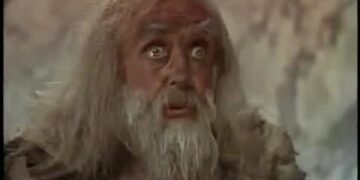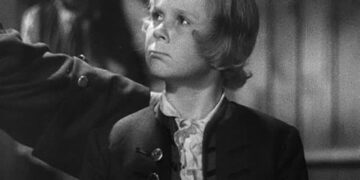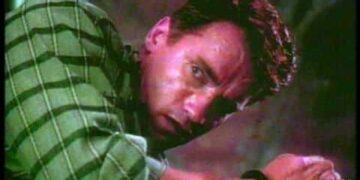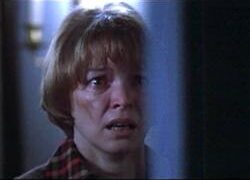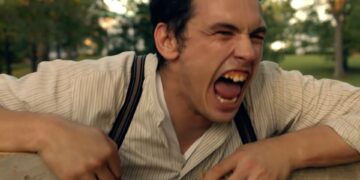“The Trial” is a renowned novel written by the Czech author Franz Kafka. First published in 1925, it tells the story of Josef K., a bank clerk who is arrested and prosecuted by a mysterious and oppressive bureaucracy for a crime that is never fully revealed. The book is a masterpiece of existential literature, delving into themes of guilt, alienation, and the absurdity of the human condition.
Summary of the book
In “The Trial,” Josef K. wakes up one morning to find himself suddenly under arrest. He is accused of an unspecified crime and is caught in a perplexing and labyrinthine legal system. As Josef K. tries to navigate through the process, he encounters bizarre characters, faces arbitrary judgments, and becomes increasingly entangled in a web of bureaucracy and paranoia. The novel explores the themes of powerlessness, the quest for justice, and the inherent absurdity of human existence.
Introduction to the film adaptation by Orson Welles
In 1962, legendary filmmaker Orson Welles adapted “The Trial” into a mesmerizing film. Welles, known for his innovative visual style and unconventional storytelling, brought Kafka’s haunting tale to life on the silver screen. The film captures the essence of the novel while adding its own unique interpretation of the story.
Summary of the film adaptation
Welles’ adaptation of “The Trial” faithfully captures the atmosphere of Kafka’s novel, immersing viewers in a nightmarish world of bureaucracy and oppression. The film follows Josef K. as he navigates the labyrinthine legal system, encountering eccentric characters and facing the arbitrary judgments of a faceless bureaucracy. Welles’ visual style, combined with his masterful use of light and shadow, creates a haunting and surreal ambiance that perfectly complements the themes of the story.
Comparing the book and the film: key differences
While both the book and the film adaptation of “The Trial” share the same core story, there are some notable differences between the two. One significant difference lies in the portrayal of certain characters and their interactions. In the book, Josef K. is depicted as a more introspective and introspective character, while in the film, Welles emphasizes the external forces and pressures that shape Josef K.’s journey.
Another difference lies in the setting and atmosphere. Kafka’s novel takes place in an unnamed city, creating a sense of universality and timelessness. In contrast, Welles’ film is set in a specific location, utilizing striking visual elements to enhance the story’s atmosphere. This divergence in setting allows the film to establish a more tangible and visually immersive world.
When and where does the story take place? Film locations
“The Trial” is set in an unspecified time and place, adding to the sense of ambiguity and universality. However, in the film adaptation, Orson Welles chose to shoot on location in Europe. The film primarily takes place in and around the city of Paris, utilizing its architecture and urban landscapes to create a unique visual backdrop for the story. The city’s grandeur and architectural complexity add depth to the narrative, amplifying the atmospheric elements of the film.
Who’s who in “The Trial” – main characters and their roles
- Josef K.: The protagonist of the story, Josef K. is a bank clerk who finds himself inexplicably arrested and caught in a convoluted legal process. Throughout the book and film, we witness his journey as he tries to make sense of his situation and seek justice.
- The Inspector: A mysterious and enigmatic figure, the Inspector is the primary antagonist in Josef K.’s ordeal. He represents the faceless and oppressive bureaucracy that Josef K. must confront.
- Fraulein Burstner: A young woman who becomes an object of desire for Josef K., Fraulein Burstner represents a brief respite from the Kafkaesque world he is trapped in. Her character adds a layer of complexity and longing to the story.
- Huld: A lawyer who offers to help Josef K. navigate the legal process, Huld embodies the complexities of the legal system and the inherent contradictions within it.
Memorable quotes from the book and the film
- “Someone must have been telling lies about Josef K., for without having done anything wrong, he was arrested one fine morning.” (Book)
- “Guilt is never to be doubted.” (Film)
- “The court wants nothing from you. It receives you when you come and dismisses you when you go.” (Book)
- “The court wants nothing from you. It receives you when you arrive, it dismisses you when you leave.” (Film)
- “It is not necessary to accept everything as true, one must only accept it as necessary.” (Book)
- “It’s not necessary for you to accept everything as true, you only have to accept it as necessary.” (Film)
Exploring the soundtrack by Jean Ledrut
The film adaptation of “The Trial” features a haunting and evocative soundtrack composed by Jean Ledrut. Ledrut’s score perfectly captures the eerie and disorienting atmosphere of the story, enhancing the viewer’s experience and adding depth to the narrative. The soundtrack combines orchestral arrangements with experimental sound design, creating a sonic landscape that mirrors the psychological journey of Josef K.
Curiosities and behind-the-scenes facts about the film adaptation
- Orson Welles faced numerous challenges while making the film, including financial constraints and conflicts with the production team. Despite these obstacles, he managed to create a visually stunning and thought-provoking adaptation of Kafka’s novel.
- The film’s distinctive visual style was achieved through the use of innovative cinematography techniques, including unconventional camera angles, deep focus shots, and chiaroscuro lighting.
- Orson Welles’ portrayal of the Inspector was inspired by his own experiences with authority figures and his skepticism towards bureaucracy. He imbued the character with a sense of menace and ambiguity.
Tips and ideas for cosplay and dressing up as Josef K. and Inspector A
- To cosplay as Josef K., consider wearing a classic suit with a slightly disheveled appearance. Add a touch of mystery by incorporating elements such as a fedora hat or a trench coat.
- For Inspector A, go for a more formal and authoritative look. A well-tailored suit, a crisp white shirt, and a tie will help create the desired aura of power and control.
- Pay attention to small details that can enhance the authenticity of your cosplay, such as accessories that reflect the time period or props related to the story, like a copy of “The Trial” or a briefcase.
Franz Kafka: A brief biography and an overview of his 5 best works
Franz Kafka was a German-language writer of Jewish descent, born in Prague in 1883. He is widely regarded as one of the most influential figures in 20th-century literature. Kafka’s writing often explored themes of alienation, guilt, and the absurdity of existence. Here are five of his best-known works:
- “The Metamorphosis”: This novella tells the story of Gregor Samsa, who wakes up one morning to find himself transformed into a giant insect. It is a powerful exploration of identity and the human condition.
- “The Castle”: In this unfinished novel, the protagonist, K., struggles to gain access to a mysterious castle, representing an unattainable and elusive authority. It delves into themes of bureaucracy, powerlessness, and isolation.
- “The Trial”: As discussed earlier, “The Trial” follows the plight of Josef K. as he navigates a nightmarish legal system. It is considered one of Kafka’s most significant works.
- “The Judgment”: This short story revolves around a conflict between a young man, Georg, and his domineering father. It explores the complexities of family dynamics and the burden of guilt.
- “A Hunger Artist”: This poignant short story examines the life of a professional fasting artist and his struggle for meaning and recognition in a world that fails to appreciate his art.
Other media adaptations of Kafka’s works by Orson Welles
In addition to his adaptation of “The Trial,” Orson Welles also explored other works by Franz Kafka. One notable example is his radio adaptation of “The Metamorphosis,” which aired in 1945. Welles’ interpretation of Kafka’s story brought a new dimension to the narrative, utilizing sound effects and voice acting to immerse listeners in Gregor Samsa’s transformation.
10 similar movies to “The Trial” in terms of theme or plot
- “Brazil” (1985): Directed by Terry Gilliam, this dystopian film shares themes of bureaucracy, surveillance, and the struggle against an oppressive system.
- “The Matrix” (1999): The Wachowski siblings’ iconic sci-fi film explores themes of control, identity, and the search for truth within a simulated reality.
- “A Clockwork Orange” (1971): Directed by Stanley Kubrick, this film delves into questions of free will, morality, and the consequences of societal control.
- “Metropolis” (1927): Fritz Lang’s classic silent film portrays a futuristic city divided between the working class and the ruling elite, touching on themes of oppression and rebellion.
- “Blade Runner” (1982): Ridley Scott’s neo-noir sci-fi film raises questions about artificial intelligence, identity, and the nature of humanity.
- “The Lobster” (2015): Yorgos Lanthimos’ dark comedy explores the absurdities of societal norms and the pressure to conform in matters of love and relationships.
- “1984” (1984): Michael Radford’s adaptation of George Orwell’s dystopian novel examines themes of surveillance, conformity, and the individual’s struggle against a totalitarian regime.
- “The Lives of Others” (2006): This German film reveals the oppressive surveillance state of East Germany and the impact it has on the lives of its citizens.
- “Eternal Sunshine of the Spotless Mind” (2004): Michel Gondry’s romantic sci-fi film explores themes of memory, identity, and the complexities of human relationships.
- “Enemy” (2013): Directed by Denis Villeneuve, this psychological thriller delves into themes of duality, identity, and the fear of the unknown.
5 other notable works by Franz Kafka
- “The Castle” (1926): Kafka’s novel tells the story of K., who seeks access to a mysterious castle but faces countless obstacles and bureaucratic absurdities along the way.
- “Amerika” (1927): This unfinished novel follows the adventures of the young protagonist Karl RoíŸmann as he immigrates to the United States and navigates the complexities of American society.
- “The Metamorphosis” (1915): Kafka’s famous novella explores the alienation and existential crisis of Gregor Samsa, who wakes up one morning transformed into a giant insect.
- “In the Penal Colony” (1919): This chilling short story depicts a bizarre execution device that inscribes the sentence onto the convict’s body as a form of punishment.
- “The Hunger Artist” (1922): Kafka’s poignant short story examines the life of a professional fasting artist and the profound loneliness and alienation he experiences.
Book club discussion questions for “The Trial”
- How does the theme of guilt manifest throughout the novel? What are the different forms of guilt experienced by Josef K.?
- Discuss the role of bureaucracy in “The Trial.” How does the labyrinthine legal system contribute to Josef K.’s sense of powerlessness and despair?
- Explore the significance of the character of the Inspector. What does he represent in the context of the story? How does his presence impact Josef K.’s journey?
- The novel raises questions about the nature of justice and the search for truth. How does Kafka explore these concepts through Josef K.’s experiences?
- Kafka’s writing often reflects a sense of existential dread and the absurdity of human existence. How does this theme manifest in “The Trial”? What elements of the story contribute to this feeling?
10 similar novels with a similar plot to “The Trial”
- “Nineteen Eighty-Four” by George Orwell: This dystopian novel portrays a totalitarian society where the protagonist faces a similar struggle against an oppressive regime.
- “Catch-22” by Joseph Heller: Set during World War II, this satirical novel explores the absurdity and futility of war through the experiences of the protagonist, Captain Yossarian.
- “One Hundred Years of Solitude” by Gabriel Garcia Marquez: Marquez’s novel follows the Buendia family through multiple generations, delving into themes of fate, solitude, and the cyclical nature of time.
- “The Stranger” by Albert Camus: This existential novel tells the story of Meursault, a detached and indifferent protagonist who faces a trial for a seemingly senseless crime.
- “Brave New World” by Aldous Huxley: Huxley’s dystopian novel presents a society where individuality and personal freedom are sacrificed for the sake of stability and control.
- “We” by Yevgeny Zamyatin: This dystopian novel explores a society where individuality is suppressed, and conformity is enforced through strict surveillance and control.
- “The Castle” by Franz Kafka: Kafka’s own novel shares similarities with “The Trial,” as it follows a protagonist’s struggles against a mysterious and inaccessible authority.
- “The Handmaid’s Tale” by Margaret Atwood: Set in a totalitarian society, this novel depicts a woman’s struggle for survival and autonomy in a world where women are reduced to reproductive roles.
- “Animal Farm” by George Orwell: Orwell’s allegorical novel satirizes the corruption of power and the dangers of totalitarianism through the story of a group of farm animals.
- “The Plague” by Albert Camus: Camus’ novel explores the impact of an outbreak of the bubonic plague on a town, delving into themes of isolation, despair, and the human condition.
A Parent Guide to “The Trial” – Content Advisory and Discussion Points
If you’re a parent who wants to introduce your child to the world of Franz Kafka through The Trial, it’s important to be aware of the content and themes within the book. While The Trial is a masterpiece of literature, it does contain mature themes and imagery that may not be suitable for young readers. Here are some points to consider when discussing The Trial with your child:
- Bureaucracy and the Absurd: The Trial explores the themes of bureaucracy and the absurdity of the human condition. Discuss with your child the concept of bureaucracy and how it is portrayed in the book.
- The Individual vs. Society: The protagonist, Josef K., finds himself at odds with society and its oppressive systems. Talk to your child about the importance of individuality and the consequences of blindly conforming to societal norms.
- Existential Angst: The Trial delves into existential questions about the meaning of life and our place in the world. Engage your child in a philosophical discussion about these themes and encourage them to ask their own existential questions.
- Violence and Sexual Content: The Trial contains scenes of violence and sexual content. Use your discretion when deciding if your child is ready to engage with this type of material.
By approaching The Trial with an open dialogue and providing context for the themes and content, you can ensure that your child gains a deeper understanding of Kafka’s work.
Buying Guide and Gift Ideas for Fans of “The Trial”
If you or someone you know is a fan of Franz Kafka’s The Trial, there are plenty of options when it comes to buying related merchandise or finding the perfect gift. Here are some ideas to get you started:
- The Complete Works of Franz Kafka: For the ultimate Kafka enthusiast, a collection of his complete works is a must-have. This comprehensive edition will allow readers to explore Kafka’s other masterpieces, such as The Metamorphosis and The Castle.
- Orson Welles: The Ultimate Collection: To fully appreciate Welles’ adaptation of The Trial, why not delve into his other works? This collection includes movies such as Citizen Kane, The Magnificent Ambersons, and Touch of Evil.
- Kafka-inspired Artwork: There are many talented artists who have been inspired by Kafka’s works. Look for prints or paintings that capture the essence of The Trial and display them in your home or office.
- Kafka-themed Clothing: Show off your love for Kafka with clothing featuring quotes or imagery from The Trial. T-shirts, hoodies, and tote bags are popular choices.
- Literary Journals and Notebooks: Encourage your creativity by using a Kafka-themed journal or notebook. These can be used for writing, sketching, or simply jotting down your thoughts.
By exploring these options, you can find the perfect gift for yourself or a fellow fan of The Trial.
Conclusion
In conclusion, the journey from page to screen is a complex one, especially when it involves a literary masterpiece like The Trial by Franz Kafka. Orson Welles’ adaptation of the novel brings a unique perspective and interpretation to the story, while still capturing the essence of Kafka’s themes and characters. By exploring the differences between the book and the movie, we gain a deeper appreciation for both mediums and the creative minds behind them. Whether you prefer the written word or the cinematic experience, The Trial is a thought-provoking exploration of the human condition that will continue to captivate audiences for generations to come.


